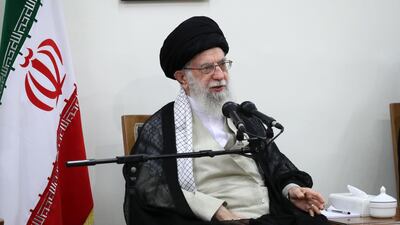Iran has said the “road to diplomacy” with the United States is now permanently closed following a raft of sanctions imposed on Tehran’s leaders and denied it wants nuclear weapons.
Foreign Ministry spokesman Abbas Mousavi said in a statement that the “fruitless sanctions ... mean the permanent closure of the road of diplomacy with the frustrated US administration”.
His words were echoed by Iran’s President Hassan Rouhani, who also slammed the sanctions and said the White House was “afflicted by mental retardation”.
He called the sanctions targeting the country’s supreme leader, Ayatollah Ali Khamenei, “outrageous and idiotic”, saying they would ultimately fail as Mr Khamenei had no assets abroad.
The Trump administration announced the sanctions on top officials as it sent officials to the Middle East and Europe and called for consumers of Middle Eastern oil to share the burden of protecting shipping lanes.
Zarif: Iran would never pursue nuclear weapons
Also on Tuesday, Iran's Foreign Minister Javad Zarif said the country would never pursue nuclear weapons, IRIB news agency reported.
"You were really worried about 150 people? How many people have you killed with a nuclear weapon? How many generations have you wiped out with these weapons?" Mr Zarif said.
"It is us who, because of our religious views, will never pursue a nuclear weapon."
Mr Zarif was referring to the decision last week by US President Donald Trump to call off an air strike on Iran on the grounds that it would kill 150 people.
The cancelled strikes came in response to the shooting down of a US drone over the Strait of Hormuz, in an attack that President Rouhani called a “great thing to do” on Tuesday.
US disarmament ambassador Robert Wood said the Trump administration had shown great restraint in the wake of the incident, which, he said, should not be mistaken for weakness.
“We will not initiate a conflict against Iran, nor do we intend to deny Iran the right to defend its airspace, but if Iran continues to attack us our response will be decisive,” Mr Wood told the Conference on Disarmament in Geneva.
The US claims to have hit Iranian military computers with a cyberattack in the wake of the attack.
The Trump Administration is insistent that Iran will not have a nuclear weapon, a fear which prompted the 2015 nuclear deal, which prohibited Iran's enrichment and stockpiling of uranium.
Iran has been testing and developing ballistic missiles, an action a UN resolution discourages them from doing, raising fears they could be equipped with a nuclear warhead.
The EU, France, Germany and the UK are all still signatories to a 2015 nuclear deal from which Mr Trump withdrew last year. It relieves international sanctions in exchange for Iran curtailing its nuclear ambitions.
Europe’s attempt to circumnavigate US sanctions on Iran has infuriated Washington, although all countries agree on the need to counter Iranian aggression following rattacks on six tankers in the Gulf of Oman and bombings of a Saudi Arabian airport.
